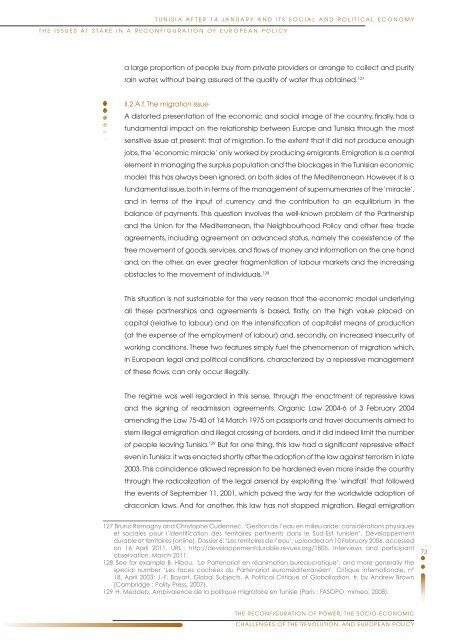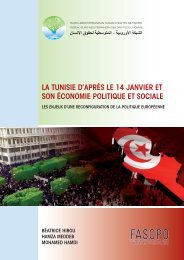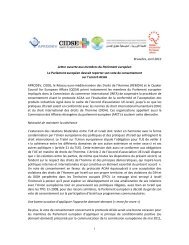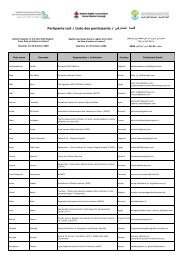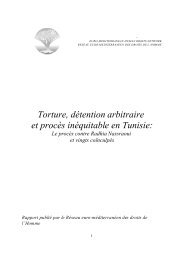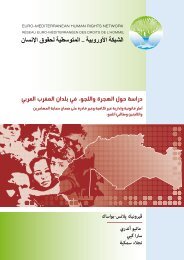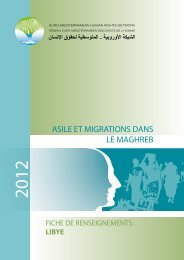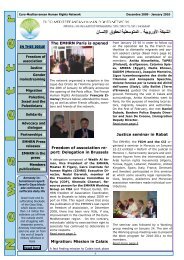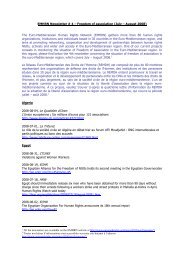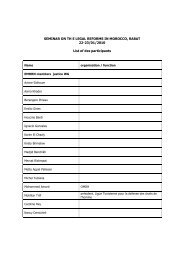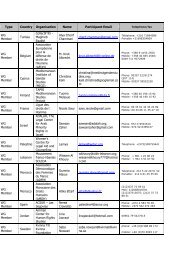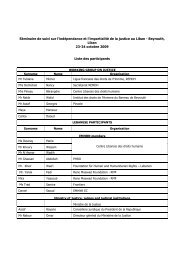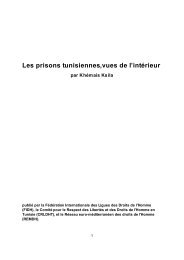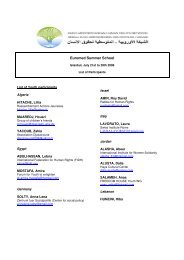tunisia after 14 january and its social and political economy - Refworld
tunisia after 14 january and its social and political economy - Refworld
tunisia after 14 january and its social and political economy - Refworld
You also want an ePaper? Increase the reach of your titles
YUMPU automatically turns print PDFs into web optimized ePapers that Google loves.
T U N I S I A A F T E R 1 4 J A N U A R Y A N D I T S S O C I A L A N D P O L I T I C A L E C O N O M YT H E I S S U E S A T S T A K E I N A R E C O N F I G U R A T I O N O F E U R O P E A N P O L I C Ya large proportion of people buy from private providers or arrange to collect <strong>and</strong> purifyrain water, without being assured of the quality of water thus obtained. 127II.2.A.f. The migration issueA distorted presentation of the economic <strong>and</strong> <strong>social</strong> image of the country, finally, has afundamental impact on the relationship between Europe <strong>and</strong> Tunisia through the mostsensitive issue at present: that of migration. To the extent that it did not produce enoughjobs, the ‘economic miracle’ only worked by producing emigrants. Emigration is a centralelement in managing the surplus population <strong>and</strong> the blockages in the Tunisian economicmodel: this has always been ignored, on both sides of the Mediterranean. However, it is afundamental issue, both in terms of the management of supernumeraries of the ‘miracle’,<strong>and</strong> in terms of the input of currency <strong>and</strong> the contribution to an equilibrium in thebalance of payments. This question involves the well-known problem of the Partnership<strong>and</strong> the Union for the Mediterranean, the Neighbourhood Policy <strong>and</strong> other free tradeagreements, including agreement on advanced status, namely the coexistence of thefree movement of goods, services, <strong>and</strong> flows of money <strong>and</strong> information on the one h<strong>and</strong><strong>and</strong>, on the other, an ever greater fragmentation of labour markets <strong>and</strong> the increasingobstacles to the movement of individuals. 128This situation is not sustainable for the very reason that the economic model underlyingall these partnerships <strong>and</strong> agreements is based, firstly, on the high value placed oncapital (relative to labour) <strong>and</strong> on the intensification of capitalist means of production(at the expense of the employment of labour) <strong>and</strong>, secondly, on increased insecurity ofworking conditions. These two features simply fuel the phenomenon of migration which,in European legal <strong>and</strong> <strong>political</strong> conditions, characterized by a repressive managementof these flows, can only occur illegally.The regime was well regarded in this sense, through the enactment of repressive laws<strong>and</strong> the signing of readmission agreements. Organic Law 2004-6 of 3 February 2004amending the Law 75-40 of <strong>14</strong> March 1975 on passports <strong>and</strong> travel documents aimed tostem illegal emigration <strong>and</strong> illegal crossing of borders, <strong>and</strong> it did indeed limit the numberof people leaving Tunisia. 129 But for one thing, this law had a significant repressive effecteven in Tunisia: it was enacted shortly <strong>after</strong> the adoption of the law against terrorism in late2003. This coincidence allowed repression to be hardened even more inside the countrythrough the radicalization of the legal arsenal by exploiting the ‘windfall’ that followedthe events of September 11, 2001, which paved the way for the worldwide adoption ofdraconian laws. And for another, this law has not stopped migration. Illegal emigration127 Bruno Romagny <strong>and</strong> Christophe Cudennec, ‘Gestion de l’eau en milieu aride: considérations physiqueset <strong>social</strong>es pour l’identification des territoires pertinents dans le Sud-Est tunisien’, Développementdurable et territoires (online), Dossier 6: ‘Les territoires de l’eau’, uploaded on 10 February 2006, accessedon 16 April 2011. URL : http://developpementdurable.revues.org/1805. Interviews <strong>and</strong> participantobservation, March 2011.128 See for example B. Hibou, ‘Le Partenariat en réanimation bureaucratique’, <strong>and</strong> more generally thespecial number ‘Les faces cachées du Partenariat euroméditerranéen’, Critique internationale, n°18, April 2003; J.-F. Bayart, Global Subjects. A Political Critique of Globalization, tr. by Andrew Brown(Cambridge : Polity Press, 2007).129 H. Meddeb, Ambivalence de la politique migratoire en Tunisie (Paris : FASOPO, mimeo, 2008).73The reconfiguration of power, the socio-economicchallenges of the revolution, <strong>and</strong> European policy


